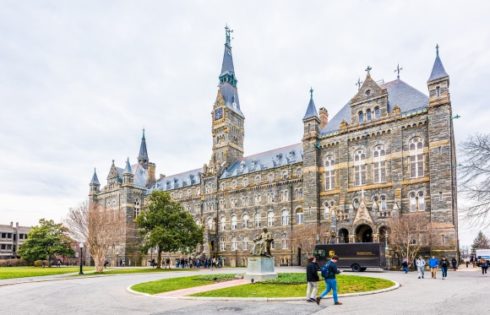
He has ‘tenable claims’ that his constitutional rights were violated
More than two years after First Amendment advocacy groups asked the Rhode Island Supreme Court to overturn a trial ruling that threatened the conscience rights of college students, the high court obliged.
Now it’s sending the case of William Felkner – whose dispute with Rhode Island College goes back 15 years – to a jury to sort out.
Felkner’s problem with the School of Social Work had to do with its refusal to let him advocate for causes he believes in. His “policy and organizing” professor and more senior officials confirmed the grad student was required to lobby the Legislature in favor of policies he opposes, namely for “social and economic justice” in the progressive worldview.
When he refused, Felkner was given a failing grade. The self-described conservative libertarian filed suit in 2007.
The Rhode Island Supreme Court said it wasn’t going to “determine the breadth of Felkner’s constitutionally protected rights of speech and expression” in the program, or whether such rights are “necessarily tempered by ‘legitimate pedagogical concerns.'”
That refers to a controversial Supreme Court ruling (Hazelwood), initially applied to high schools and later colleges, that allowed public educational institutions to regulate student speech “in school-sponsored expressive activities so long as their actions are reasonably related to legitimate pedagogical concerns.”
Rather, the high court said its only mission was to determine whether “genuine issues of material fact exist” in the case.
On this point, it cited an affidavit by the then-dean of the University of Pennsylvania’s social-policy program, Richard Gelles, supporting Felkner. He said the college’s alleged behavior was “contrary to the concepts of academic freedom and constitute a substantial departure from the norms of academic debate.” That would override Hazelwood protections for high schools and colleges.
“In light of these principles, we are of the opinion that Felkner’s freedom of speech claims
deserve to go to a jury,” the high court said:
The record in this case is voluminous and replete with disputed facts. Resolving all such facts in the light most favorable to Felkner, the issue is whether he has made tenable claims that defendants have violated his constitutional rights to free speech and expression. We believe that he has.
The jurists questioned whether the program’s requirements for students including Felkner were “reasonably related to legitimate pedagogical concerns” or simply “pretextual” in order to punish the student for his views.
It highlighted Felkner’s allegations that he was ordered to lobby for positions he disagrees with “in a public forum” rather than a classroom setting, and that his viewpoint was declared “not welcome in the classroom because it is contrary to the majority viewpoint of the students and faculty.”
The court found “ample evidence in the record” that Felkner’s program had a “strong predisposition toward so-called ‘progressive’ social values.” Given these “genuine issues of material fact” on whether the program was motivated by pedagogical or pretextual concerns, it vacated the trial judgment on his First Amendment claim and remanded to the trial court “for trial or other disposition.”
The trial will also determine whether any of the defendants – former President John Nazarian, former Dean Carol Bennett-Speight of the social-work school, and three professors – have qualified immunity. That would mean their allegedly unconstitutional actions against Felkner were not “clearly established” in law.
Now 55 and still without a graduate degree, Felkner has a daughter who is looking at colleges, he told the Providence Journal. “[I]t would be nice to make sure RIC does not continue this discrimination for her generation,” he said.
He now runs business operations for a nonprofit investigative reporting organization, the Hummel Report, that partners with the Journal.
The Foundation for Individual Rights in Education has been advocating for Felkner’s right to pursue his degree without compelled speech since the beginning, it noted in an update on the case Tuesday.
Its friend-of-the-court brief with the Cato Institute and National Association of Scholars was acknowledged by the high court in Monday’s ruling, the only apparent outside brief filed with the court.
MORE: Groups tell high court RIC can’t force Felkner to lobby for leftist causes
Read the ruling, FIRE post and Journal report.
IMAGE: Happy Stock Photo/Shutterstock
Like The College Fix on Facebook / Follow us on Twitter






Please join the conversation about our stories on Facebook, Twitter, Instagram, Reddit, MeWe, Rumble, Gab, Minds and Gettr.